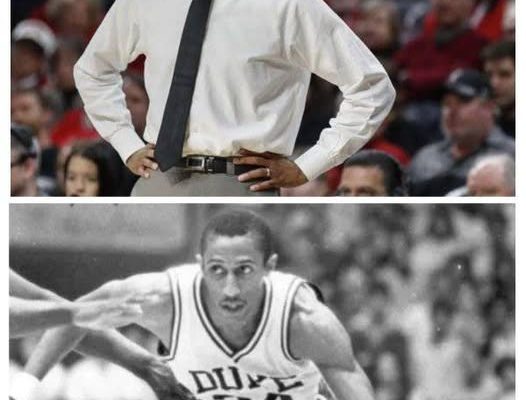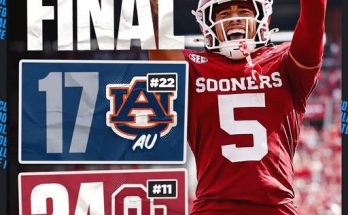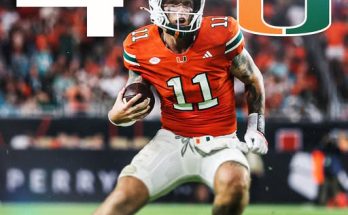”
From Duke Legend to DC Hall of Fame: Johnny Dawkins Shocks Fans with Surprise Induction into…
When the name Johnny Dawkins is mentioned in basketball circles, it’s often followed by a deep reverence and a nod to one of the game’s most respected minds—both on and off the court. While his legacy at Duke University has long been cemented in the lore of college basketball, few could have predicted the stunning moment when the Washington, D.C. native was announced as a surprise inductee into the DC Sports Hall of Fame. It was a moment that took even his most devoted fans off guard—an honor long overdue, but all the more satisfying for its unexpectedness.
In a time when sports ceremonies are often leaked and announcements carefully choreographed through social media, this was something refreshingly organic. No early press release. No social media hints. Just a warm, summer day at Nationals Park, a familiar hum of the crowd buzzing before a Nationals game, and then—the announcement that sent a ripple through the stadium and the basketball world alike. Johnny Dawkins, son of Washington, D.C., was being inducted into the DC Sports Hall of Fame.
To understand the magnitude of this moment, you must first understand the journey. Dawkins’ basketball career is the story of discipline, transformation, and quiet greatness. Born and raised in the nation’s capital, he cut his teeth on the asphalt courts of Southeast D.C., where the competition was fierce and the love for the game even fiercer. By the time he suited up for Mackin Catholic High School, Dawkins had already developed a reputation for being a relentless competitor with a smooth jumper and an almost preternatural court vision. It was clear he wasn’t just another high school standout—he was destined for greatness.
That greatness found its first national stage at Duke University in the early 1980s. Under the tutelage of a young Coach Mike Krzyzewski, Dawkins became the cornerstone of a program on the rise. When he arrived in 1982, Duke was far from the powerhouse it would later become. By the time he left in 1986, he had not only become the school’s all-time leading scorer (a record he held for years) but had also led the Blue Devils to the NCAA Championship game in his senior year.
Dawkins was the spark that ignited the Duke dynasty, a trailblazer for future legends like Grant Hill, Christian Laettner, and J.J. Redick. His jersey—number 24—was retired in Cameron Indoor Stadium, a testament to the influence he had on the program and the respect he earned from teammates and coaches alike. Yet despite these accolades, Dawkins never carried the air of a superstar. He remained modest, focused, and deeply appreciative of the opportunities basketball gave him.
Following his storied collegiate career, Dawkins entered the NBA as the 10th overall pick in the 1986 NBA Draft, selected by the San Antonio Spurs. Over nine seasons in the league, he played for the Spurs, Philadelphia 76ers, and Detroit Pistons, providing steady production and veteran leadership. Though he never achieved All-Star status in the NBA, he brought the same intelligent play, sharp shooting, and unselfishness that had defined his college career. It was clear to those watching that Dawkins was a basketball mind more than just a player—and that his next chapter might be even more impactful than his playing days.
That next chapter came in coaching. After retiring as a player, Dawkins returned to Duke in 1998 as an assistant coach under Coach K, beginning a decade-long stretch that helped elevate the program even further. Players spoke glowingly of his mentorship. He wasn’t the loudest voice in the room, but when he spoke, they listened. His connection to the players—both as someone who had been in their shoes and someone invested in their future—was palpable. He was instrumental in the development of countless Duke stars and in sustaining the culture of excellence that had taken root during his playing days.
In 2008, Dawkins took the reins as head coach at Stanford University, embracing the challenge of building a winning program in the fiercely competitive Pac-12. He led Stanford to multiple postseason appearances, including an NIT Championship in 2012 and a Sweet 16 run in the NCAA Tournament in 2014. His ability to balance academics and athletics, instill discipline, and develop young talent earned him widespread respect in coaching circles.
But it was his next move, to the University of Central Florida (UCF) in 2016, that again showcased his ability to transform a program. In just his third season, he led UCF to a 24-9 record and the program’s first NCAA Tournament win. In a dramatic Round of 32 matchup, his Knights nearly toppled his alma mater Duke in a heart-stopping game that ended 77-76. It was a full-circle moment—student versus teacher, mentor versus institution—and though UCF lost, Dawkins’ leadership and grace stood out more than the final score.
Despite all of this, Dawkins had never received the kind of hometown recognition that matched his contributions. While D.C. boasts a rich basketball history—Elgin Baylor, Kevin Durant, Dave Bing, and others—Dawkins’ name had quietly lingered outside the local spotlight. Perhaps it was because his college stardom came in North Carolina. Perhaps it was because his NBA career was solid but not headline-grabbing. Or perhaps it was simply that Dawkins, in his own way, never sought the spotlight. That’s why this induction into the DC Sports Hall of Fame meant so much—not just to him, but to those who followed his journey from Southeast D.C. to national prominence.
The ceremony itself was deeply personal. Dawkins took the stage to a standing ovation from a crowd that included family, former coaches, and fans who remembered his high school days. He spoke with humility and emotion, recalling the D.C. playgrounds that shaped him, the coaches who guided him, and the city that, in his words, “taught me how to fight for what I love.”
“This is home,” Dawkins said. “Before I ever put on a Duke jersey or coached a game, I was a kid running drills on a cracked court in Southeast. This city raised me, challenged me, and believed in me. To be honored like this, right here, where it all started—this is one of the most meaningful moments of my life.”
It wasn’t just fans and former teammates who were moved. Coach Mike Krzyzewski released a statement saying, “Johnny has always been a Hall of Famer in my book. His work ethic, his leadership, his heart—those things go beyond stats. He helped build Duke Basketball into what it is today, and he’s carried that same excellence throughout his coaching career. I’m thrilled to see him recognized by his hometown in this way.”
Other D.C.-area legends, including John Thompson III and former NBA player Steve Francis, also expressed admiration for the honor, calling it “long overdue” and a “testament to quiet greatness.”
In an era that often celebrates flash and fast fame, Johnny Dawkins represents something increasingly rare—a career built on substance, humility, and a deep love for the game. His induction into the DC Sports Hall of Fame isn’t just a celebration of a remarkable career; it’s a reminder of the values that matter most in sports and in life.
For young athletes growing up in D.C. today, Dawkins’ story is proof that you don’t need to be the loudest to make the biggest impact. That being a student of the game, staying true to your principles, and lifting others as you climb can lead to the kind of legacy that transcends stats or headlines.
As he stood on the stage, accepting his induction, Dawkins was characteristically understated. But his eyes shimmered with the reflection of a life fully lived through basketball—a game that took him from city playgrounds to packed arenas, from player to mentor, from legend to Hall of Famer.
And though his name is now etched alongside the greats in D.C. sports history, perhaps the most powerful part of Johnny Dawkins’ legacy is that he never stopped being the kid from Southeast with a dream—and he never forgot where he came from.
Would you like this formatted for publication (e.g., in blog or magazine style), or with a headline image suggestion?



